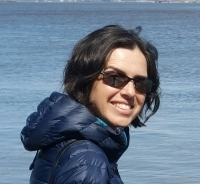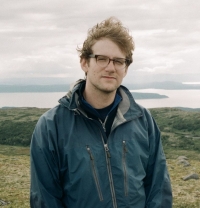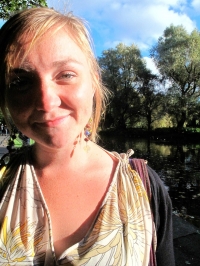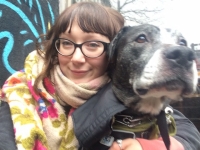José is currently a Ph.D. student in the Department of Geography, Urban and Environmental Studies at Concordia University. He holds a master's degree in Geomatics from CONACYT Research Centre "Ing. Jorge L. Tamayo" and a B.A. in Human Geography from The Metropolitan Autonomous University in Mexico City. Currently, he is studying the Mount Royal and Notre Dame des Neiges Cemeteries in Montreal to learn about the past and current geographies of migrants. Concretely, he wants to know how cemeteries’ landscapes could reveal a sense of place, belonging, and identity among migrant groups within their adopted communities. He is using Deep Mapping as his primary methodology. Deep Mapping is an emerging approach that draws from both digital humanities and geospatial technologies and seeks to provide a more profound and richer understanding of places. However, since Deep Mapping is still an emerging concept, his research also aims at contributing to the development of Deep Mapping as a relevant geographical methodology. José’s research interests include Everyday Geographies, Spatial Narratives, Deep Mapping, Migration, and Deathscapes.
Graduate Student Profiles
José Alavez (PhD)

Véronique Bussières (PhD)

Véronique Bussières is a Ph.D. candidate in the INDI program, working under the supervision of Dr. Monica Mulrennan. Her research has been funded by SSHRC, QCBS and NSTP. She holds a B.Sc. in Biology from McGill University (2001) and an M.A. in Public Policy and Public Administration (2005) from the Department of Geography, Planning and Environment at Concordia. Veronique has been doing research in partnership with the Cree First Nation of Wemindji, Northern Québec, since 2003. Building on her Master's thesis research which on the relationship between the Crees of Wemindji and their coastal territory, her current work explores indigenous environmental stewardship in coastal and marine environments. She is interested in getting a better understanding of how indigenous environmental stewardship can transform conservation approaches in Canada, in particular with regards to protected areas in coastal environments. She is drawing on her background in conservation biology, political science and human geography to analyse the complex institutional and governance context of eastern James Bay. Outside of her academic life, Véronique is the proud mother of three boys, aged 3, 7 and 10. She also finds the time to be an active community member; she was invited to sit on the board of directors of the Québec chapter of the Canadian Parks and Wilderness Society (SNAP) since May 2016 and has been the elected president of her children’s school Governing Board for the past 4 years.
Daniel Horen Greenford (PhD)

Daniel Horen Greenford is a PhD student under the supervision of climate scientist Damon Matthews and a member of the Climate Justice Cohort in the Economics for the Anthropocene (E4A) project. A native Montrealer, he returned home after completing a BSc in physics from the University of Edinburgh. Daniel’s research aims to define and quantify fault for — and responsibility to act on — climate change. Daniel sees his work as applicable to the wider problem of determining responsibility for the degradation or overuse of the commons. His master’s thesis “The equitable allocation of greenhouse gases” proposed a way to fairly share greenhouse gases embodied in trade amongst nations and revised national emissions inventories. His current work includes building a case for the responsibility of fossil fuel producers, assessing the climate impacts of pipelines and of investments in the oil and gas sector, as well as determining climate finance obligations based on climate debts owed by developed countries to developing ones. He is also active in efforts to decarbonize Canada, be it through the opposition of new fossil fuel infrastructure like pipelines or through the adoption of ambitious reduction pathways demanded by scientific evidence. You can read his recent op-ed in National Observer on the myopia of Canadian climate policy.
Mira Baba (MSc)

Mira is a landscape architect and a MSc student under the supervision of Silvano De la Llata. She is interested in studying cultural landscapes, sense of place and community-based design. Her master's research ties these interests, as she's exploring the community’s perceptions as a tool in planning and designing indeterminate spaces of a gentrified post-industrial neighborhood.
Chloe Boone (MSc)

Chloe holds an honours degree in Human Environment from Concordia University (2016), which examined the experiences of collaborative water stewardship between Indigenous communities and the governments of Quebec and Canada. Her master’s research will explore Indigenous and Community Conservation Areas (ICCAs) as sites of reterritorialisation and their potential for healing relationships. She is particularly interested in confluent aquatic and marine sites, both as metaphor, and for the intersections that those sites bring to relationships.
Working thesis title: "Coastal ICCAs: The healing potential of reterritorialisation"
Hannah Brais (MSc)

Hannah Brais received her BA in Urban Planning from Concordia. She currently works as a housing and employment advocate while her research, under the supervision of Ted Rutland, is focused on the legal economic geography of private rental housing policies as they affect both large rental corporations and tenants across Canada. Prior to entering the MSc program Hannah worked and studied in welding, design, the non-for-profit sector, and the culinary world. Her larger research interests are primarily concerned with precarious populations and financialization.
Stephanie Mary Rose Eccles (MSc)

Stephanie Mary Rose Eccles is a MSc candidate guided by feminist principles of care ethics in both her activism and academia, specifically looking at human relationships with nonhuman animals marked as unwanted. Currently, this is taking shape in a project that interrogates the Pest Control Industry and the employment of scientific discourses that both discursively and literally trap nonhuman animals marked as pests in a cycle of undesirability and disposability. She is also working on project investigating the affects on both human companions and pitbull-type dogs by the City of Montreal’s breed specific legislation that was officially introduced October 3rd, 2016. Stephanie is affiliated with the Institute for Critical Animal Studies as the student coordinator and a member of Concordia’s CISSC 2017-2018 working group, SPAM, a research current in Animal Studies and Post-humanism. Her research is supported by SSHRC Graduate Scholarship (CGS M).
Kiley Goyette (MSc)

Kiley Goyette is an MSc student interested in cultural politics around issues of gender and race in urban residential spaces such as homes and neighbourhoods. A previous project examined how local history was deployed in one of Montreal’s most important immigrant-receiving neighbourhoods. Her current research examines the responses of community organisations, urban planners, the public housing office and the police to a security crisis in a central Montreal neighbourhood in the 1980-90s. Her paper on biopolitics and the role of nursing labour at an early 20th century contagious disease hospital was selected for the 2016 Student Essay Award of the Historical Geography Study Group of the Canadian Association of Geographers. Her Master’s research is supported by the Joseph-Armand Bombardier Canada Graduate Master’s Scholarship of the Social Science and Humanities Research Council of Canada (SSHRC). She has also received the David Frost Memorial Scholarship (2014) and the Bogdan Zaborwski Medal in Geography (2014).
Jing Xie (MSc)

Jing Xie is a Msc candidate in the department of Geography, Planning and Environment at Concordia University. She obtained BA in Urban Planning at Nanjing University, China. Her research interests are related to urban morphology, urban planning and design. Currently she is working on her thesis research on the relationship between urban form and accessibility to fresh food in Montreal, which is an enquiry into the spatial distribution of fresh food retail establishments, in relation to transportation networks and the built environment.
Mo Wang (MSc)

Mo Wang did her Bachelor's at Sun Yat-sen University, China, and is pursuing her Master’s degree at Concordia University. Her academic interest aims to relate VGI with public health with a specific focus on studying the potential in tracking the spread of epidemic disease by using location names mentioned in the social media. In this way, she is focusing on the corelationship between Twitter place names and the Zika virus outbreak. She is also interested in geoparsing technologies.
